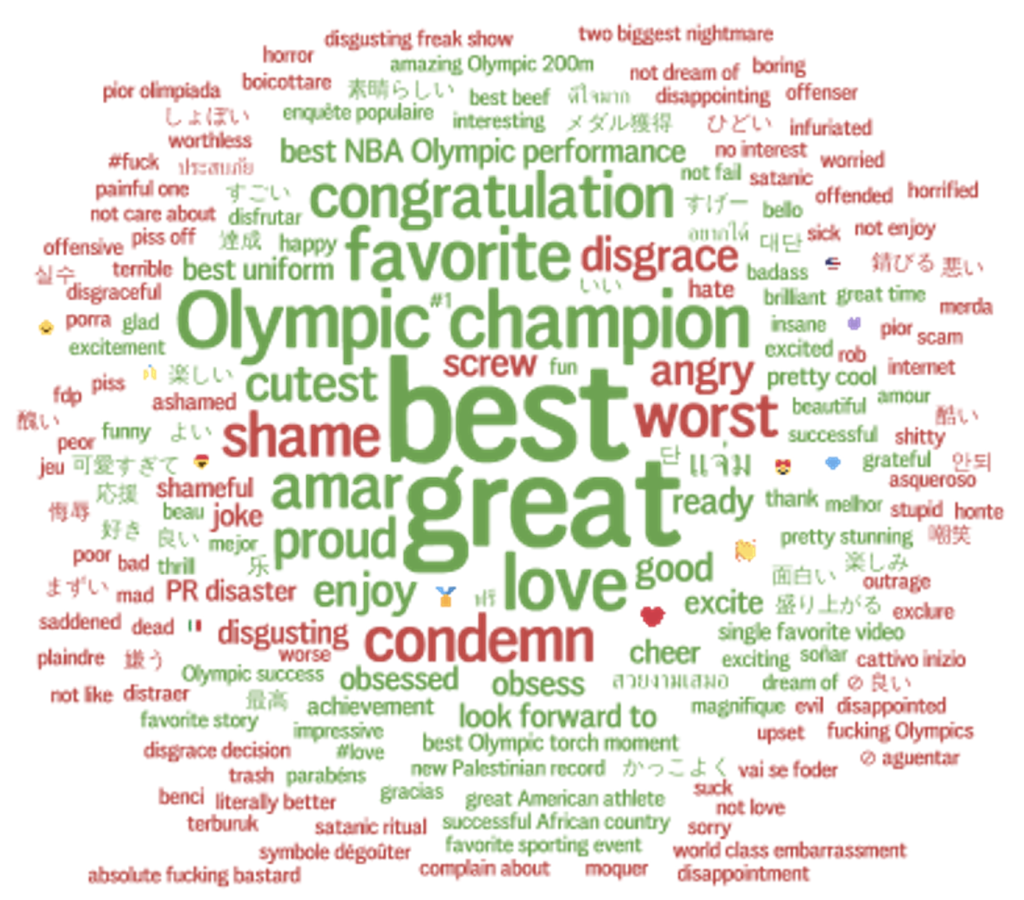
Dr. Roxane Coche
Associate Professor and Department Chair in the University of Florida, College of Journalism and Communications. She covered three Olympic games as a journalist, publishes on sports communication and sports sociology, and teaches sports media.
Email: rcoche@ufl.edu
Twitter: @roxanecoche
Instagram: @cjc.drc
Website: http://linkedin.com/in/roxanecoche

Dr. Nathan Carpenter
Director of the Atlas Social Media Listening Lab in the University of Florida, College of Journalism and Communications. He analyzes social media for academia and industry and is co-author of the textbook Social Media Research Methods (2023, Cognella Academic Publishing).
Email: nathancarpenter@ufl.edu
Bluesky: @n8carp.bsky.social
Instagram: @ufatlaslab
Website: https://www.linkedin.com/in/nathan-carpenter-phd-654140a/
With emoticons and capital letters to show his excitement, soccer superstar Antoine Griezmann reported every French Olympic medal on X (formerly Twitter). This prompted French fans to joke about the 2018 World Champion being the community manager the Paris Olympics didn’t know they needed. Even President Macron alluded to Griezmann’s much appreciated initiative. When a rumor suggested the French President had asked his team to create an application to allow him to follow all French Olympic athletes’ results in real time, he took to X with a touch of humor: “The app is called @AntoGriezmann,” he wrote—in French.
Social media have been a major tool for real-time interaction and engagement for almost two decades, but the International Olympic Committee (IOC) has had strict rules about social media use from Olympic actors (athletes, broadcasters, volunteers, etc.) in order to safeguard the Olympic movement’s intellectual property. These restrictions likely played a role in NBC’s unimaginative use of social media during the Rio Olympics in 2016, as the network used Twitter fairly traditionally, according to Sipocz and Coche—almost exclusively for one-way communications to generate excitement for its broadcast programs rather than attempting to engage in dialogue.
In January 2024, though, the IOC introduced a significant overhaul of its social and digital media guidelines shifting to a more nuanced approach that balances commercial interests with the desire for authentic athlete engagement. Paris 2024 showed the IOC’s decision to relinquish some control paid off as social media use from Olympic actors and publics remained largely positive all while offering a less sanitized, more authentic portrayal of the Games.
Indeed, the Atlas Lab at the University of Florida College of Journalism and Communications tracked more than 140 keywords and terms related to the 2024 Olympic Games in Paris, using the Quid social media listening platform. This search found more than 93.7 million posts across 48 languages created between July 26th, the day of the opening ceremony, and August 12th, the day after the closing ceremony.
The majority of these posts were on X (88.4 million). The other 5 million were YouTube posts or comments (1.4 million), public Instagram posts or comments (1.2 million), Reddit posts or comments (536,000), public Facebook page posts or comments (226,000) or from other sources including news stories, blog posts, and other online content. In total, these almost 100 million online posts had the collective capacity to generate 8.2 trillion potential impressions.
Those millions of reactions and impressions generated 5% more positive posts than negative posts, and only two moments accounted for the great majority of negative sentiment.

First, the opening ceremony on July 26th created controversy because of what some believed to be a representation of the last supper (a famous meal Jesus shared with his disciples before his crucifixion) with drag queens, which offended many Christians. International calls for boycotts lasted for days after the opening ceremony, though the Paris 2024 organizers explained the scene was actually inspired by a painting of the Greek gods of Olympus at the Musée Magnin in Dijon (a French city about 200 miles from Paris).
Second, another controversy started on August 1st about the gender identity of Algerian boxer Imane Kheliffollowing her first-round opponent’s decision to abandon after 46 seconds because of Khelif’s powerful punches. The opponent, Angela Carini from Italy, subsequently insisted her decision and actions were not politically motivated, but people still took to social media to comment on the participation of trans athletes in women’s sports—even though Khelif is not trans. French prosecutors have opened an investigation to address the online harrassment Khelif faced.
Because of those two controversies, many posts with a negative sentiment included words like “Christianity,” “disgrace,” “satanic,” “disgusting,” “opponent,” or the two boxers’ names.
Meanwhile, posts with positive sentiment often focused on athletic performance, medals and the pride people felt for their country or athletes. The aesthetics of the Olympics and the presence of other stars, like singer Celine Dion, who closed the Opening Ceremony, and rapper Snoop Dogg, who was in Paris to promote the next Summer Games in his native Los Angeles, also generated positive sentiment.

There is no doubt that this overall positive Olympic sentiment is also in part thanks to athletes’ own posts and thus the revised IOC guidelines. Athletes embraced the opportunity to share their experiences with honesty, such as American gymnast Simone Biles’ “get ready with meeee for all around finals” video on Tik Tok, and/or humor, like Norwegian swimmer Henrik Christiansen’s dozen or so videos about chocolate muffins from the Olympic village’s cafeteria. Several athletes used irony and meme culture to offer candid reflections on their performances, giving fans a chance to interact in a more personal and engaging way, which was met with enthusiasm.
Hence, the IOC has struck a better balance between athlete autonomy and commercial protection. Its next frontier is artificial intelligence, as the current guidelines ban AI-generated content in an effort to maintain the authenticity of the content shared during the Games.

